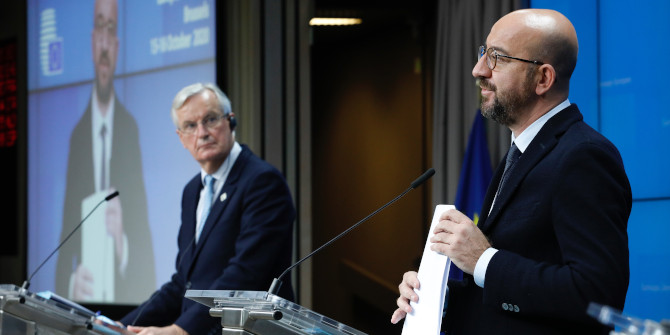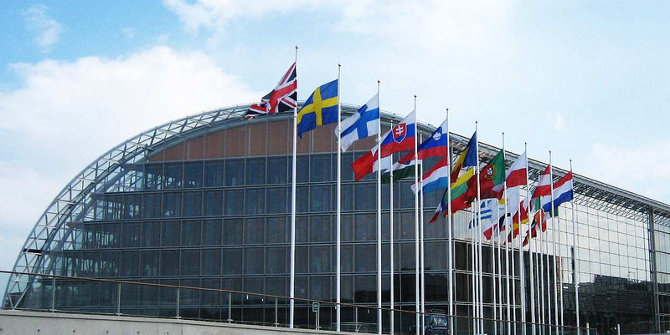The prospects for a post-Brexit trade deal between the UK and the EU look increasingly bleak following talks between EU leaders on 15 October. Bob Hancké attempts to make sense of the negotiations.
Finally, the gloves are off. French president Macron, a bit more preoccupied with containing a new outbreak of Covid-19 than with Brexit, has turned the tables and told Boris Johnson to ‘go whistle’. If the UK wants a Brexit agreement before the end of the year, it is going to have to accept the EU’s conditions, point final. UK waters should remain open for EU (especially French) fishing boats, the UK should accept it will have to dynamically ratchet up environmental and social standards if it wants to trade with the EU, and state aid should be contained to the level acceptable within the bloc.
Ignore for a moment the outsized role that fish plays in this story (though more as an object than a subject – I bet some fish are hoping for a breakdown of the talks). If Macron had any sense of French history, he would understand the power of small but symbolic communities: for years, French farmers held reform of the CAP hostage because it would destroy the typical French relationship that the French (cuisine) has with the terroir. Ignore also the slightly hallucinating notion that the party of Margaret Thatcher insists on a free hand in doling out money to new (and old) industries both to safeguard livelihoods and to bask in the ‘white heat of technology’ again. What is truly interesting here is that the EU has now, supposedly, drawn its own red lines to face off those that the UK has drawn since the 2016 referendum.
A double two-level game
A few years ago, I analysed the Brexit strategy of the UK government (a bunch of red lines) as a misconceived two-level game (2LG): if you are no longer a part of the relationship, your ‘and I want you to do this’ style of negotiating has very little power, because there is no credible ‘or else’ that you can add or even imply. Invoking domestic constituencies as constraints in international negotiations to leverage the outcome in your favour only works if you display a fundamental commitment to the arrangement that you are trying to change. It’s safe to say that the Brexit decision and the implementation since early 2017 killed that.

Michel Barnier, EU Chief Brexit Negotiator, and Charles Michel, President of the European Council, at a press conference on 15 October 2020, Credit: European Council
By making the EU’s position as hard as this, we now effectively face a ‘double 2LG’, with hard red lines on both sides. I don’t think I have ever seen this before: usually one of the parties is more committed, and thinks that any deal is better than no deal. So, we are living through a natural experiment. If both parties simultaneously reduce their win-set, the Venn diagram may suddenly end up with an empty overlapping intersection. A hard Brexit, the Australian option, name it what you will, heralds a collapse of trade talks, the end of friendly neighbourhood relations, and a weakening of both parties. That is a pretty steep price to pay for a handful of fish.
Or a chicken game?
Of course, the negotiations may have stopped being a 2LG a while ago. Imagine that Macron is difficult for other reasons than trying to resist the Anglo-Saxon aggressor (the parallels with Asterix the Gaul are a bit eery). Like everyone else, he is tired of the melodrama on the other side of the Channel, and corona is eating up a lot of the governing energy. By stating the obvious – trading with us, the largest single market in the world, means accepting our rules – Macron mobilises the power of the EU to force the UK to concede first.
The negotiations thus seem to have morphed into a chicken game: two cars race toward each other and the one to veer first loses the contest. Both cars being of roughly the same size, there are only losers if no one veers. Yet what is perhaps not entirely understood in the UK is that this is not a standard chicken game with two more or less similar cars, but a situation where one party drives a large truck and the other a motorbike. That collision will not have symmetric effects, therefore. The EU is simply banking on the Johnson government seeing that too, coming to its senses, and accepting the EU’s not entirely unreasonable demands.
A simple 2LG, actually
But what if something far more subtle is going on? Acting tough now, the EU actually offers the Johnson government a face-saving exit. The imposition of such hard (and, according to the British press, unpalatable) conditions implies that the road is open for a negotiation that will almost certainly look like a victory for the UK. Any EU concession it can now show to the audience back home will be portrayed as a Churchillian moment: the new Jerusalem will be built on the founding myth that ‘we fought them in the tunnel’—the long, secret, 24/7 endgame negotiations.
Johnson has form in this regard: the deal he negotiated last year with the EU was, actually, from the UK’s perspective a weaker deal than the one negotiated by his predecessor Theresa May and which he refused to countenance as a member of the cabinet at the time. Walking out of a room, waving a sheet of paper, shouting ‘Brexit in our time’ goes down well with the Eurosceptic press, of course, and the EU’s hard stance assures that any success now will be seen as hard-fought.
Since the future is difficult to predict, as Mark Twain suggested, I won’t place any bets on which of these logics is at play here – the double 2LG, the asymmetric chicken game, or the hidden simple 2LG. But the endgame is on, so much is clear.
Note: This article gives the views of the author, not the position of EUROPP – European Politics and Policy or the London School of Economics. Featured image credit: European Council



